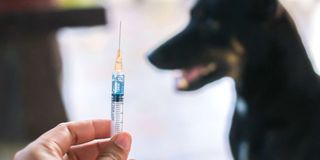Premium
Pawrenting: Handling a poisoned pet

Self-treatment like induced vomiting is not recommended because the poison could damage the stomach or oesophagus on its way up
What you need to know:
- Desist from a wait-and-see approach, taking time before you phone your vet.
- Act immediately.
- Go to the vet if you can.
Once in its lifetime, a pet will probably ingest something poisonous. Knowing how to handle the situation will make a difference in whether your pet will live or die.
So how do you handle a pet that you suspect has ingested poison. Desist from a wait-and-see approach, taking time before you phone your vet. Act immediately. Go to the vet if you can; it is difficult for medical experts to determine how your pet is doing over the phone. Getting your pet help immediately can also mean a better prognosis for them.
Tempting as it might be, do not self-treat your dog by inducing them to vomit unless your vet or poison expert specifically tells you to do so. Self-treatment like induced vomiting is not recommended because the poison could damage the stomach or oesophagus on its way up.
Carry a sample
When taking the pet to the vet, carry a sample of the item the dog or cat ingested. This is because not only will it be easier for the vet to handle the situation, the cost of knowing which poison your cat or dog has taken can be costly and takes a while.
If the poison got onto the skin, thorough washing with soap and water to prevent further skin absorption.
Of course, your eyes cannot be on your pet at all times, so they may lick or eat something poisonous when you are away. When you see your pet having the following symptoms, it could point to a problem. Look out for symptoms like excessive drooling, pacing vomiting, diarrhoea, bleeding, convulsions, or changes in the pupils, too wide or too small.
Activated charcoal
According to experts, if the vet cannot physically remove the poison, sometimes activated charcoal can be administered by mouth to prevent further absorption in the body. This is a supportive treatment that is usually necessary until the poison is removed. The kind of support vets administer usually control seizures, maintains breathing, treating shock, controlling heart problems if the cat or dog has irregular heartbeats and treating pain.
Some of the food that can be risky to pets, especially dogs include macadamia nuts, garlic, onions, and chocolates. Sometimes grapes and raisins could pose a threat.
To minimise the risk of your pets stumbling on poisonous things around the house, pet-proof your home, keep away harmful stuff like medicines locked.
Maryanne is a pet owner. [email protected]





